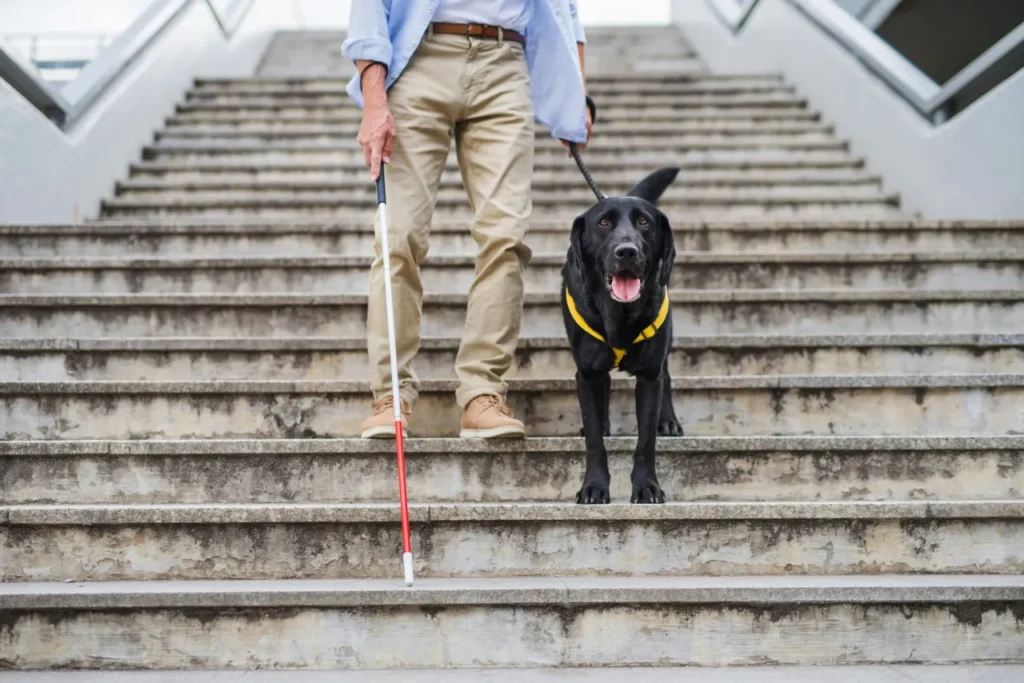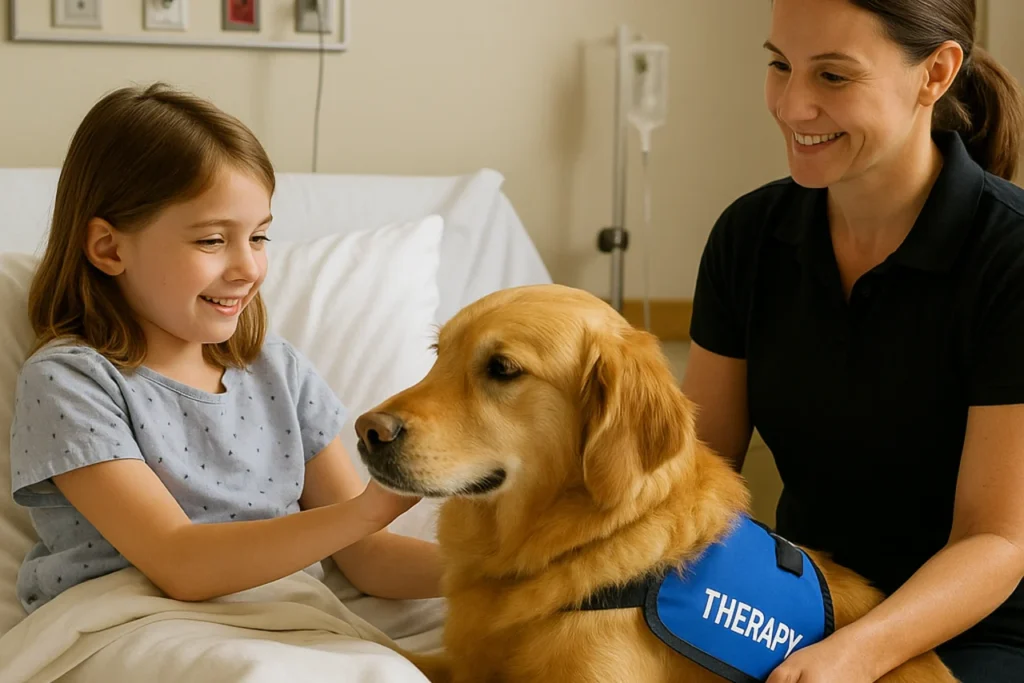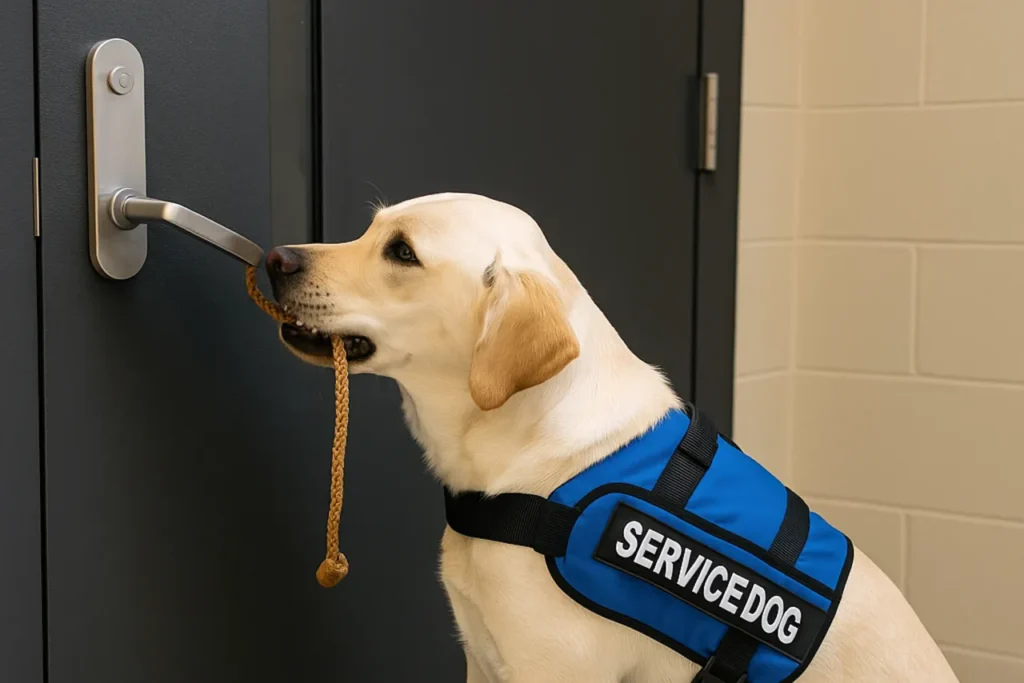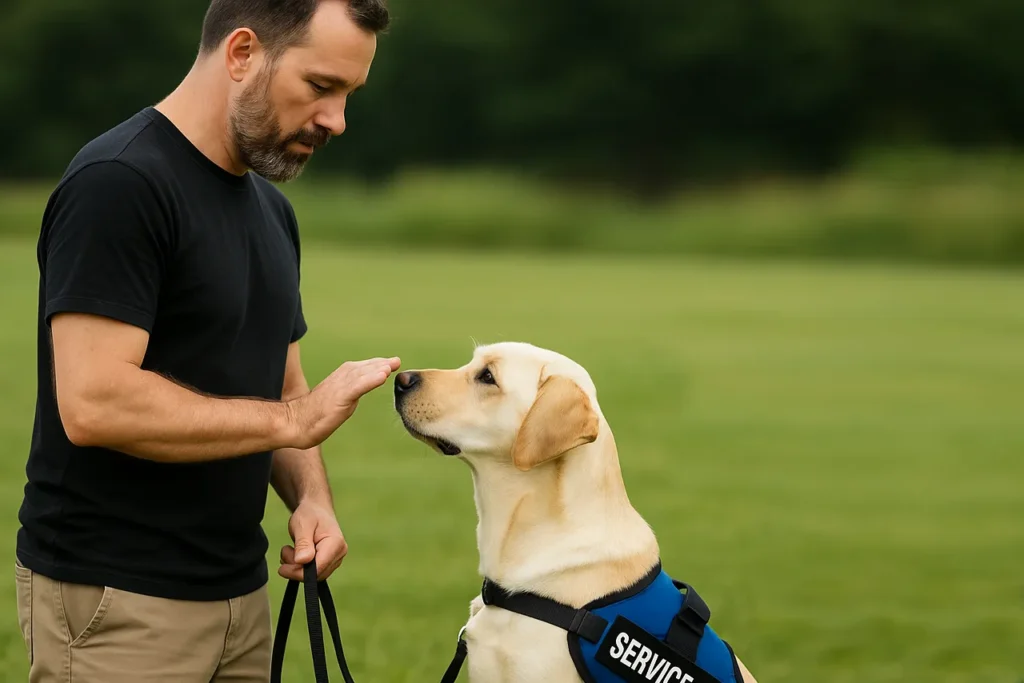Service dogs assist people with a wide range of mental injury, bipolar disorder, or post traumatic stress disorder, you may qualify for a service animal. But what disabilities qualify for a service dog and what does that mean legally? or physical disabilities, providing more than just companionship. These dogs are trained to perform specific tasks that help people navigate daily life, manage health conditions, and stay safe. Whether you’re living with an
At Off Leash K9 Oklahoma, we work with individuals and families to help determine what kind of service animal is required, and how to properly train dogs to meet those specific needs under federal guidelines.
Understanding the Americans with Disabilities Act
Under the Americans with Disabilities Act, a disability is characterized as a physical or mental health condition that significantly restricts important daily functions. This protection extends to all qualifying impairments, whether they are outwardly apparent or not.
The ADA gives individuals with disabilities the legal right to be accompanied by a trained service dog in most public spaces, including restaurants, schools, and businesses.
These dogs aren’t just emotional buffers. They are trained to help in specific moments. If someone with post-traumatic stress disorder begins to experience an anxiety attack in public, a service dog might guide them to a quieter space or apply pressure to help them calm down. Every service dog’s task must be directly related to a real, diagnosed condition. That’s what sets them apart from pets.
ADA and Service Animals: Legal Protections You Should Know
The relationship between the ADA and service animals is clear. If your dog is trained to perform tasks related to your disability, they are considered a service animal under federal law.
This protection extends to:
- Public accommodations
- Transportation
- Public and private universities
- Workplaces
- Housing covered under the Fair Housing Act
Emotional Support Animals vs. Service Dogs
Many people confuse emotional support animals with service dogs, but they’re not the same. Emotional support animals offer comfort through their presence. They are not trained to perform tasks.
In contrast, a trained service dog performs actions directly related to a person’s disability. That distinction is crucial when it comes to legal access and protections. Emotional support animals do not qualify as service animals under the ADA.
Mental Disabilities That May Qualify
Mental disabilities are among the most common reasons individuals seek a psychiatric service dog. These dogs are trained to perform calming or life-supporting tasks for people living with:
- Traumatic stress disorder, PTSD or trauma-related mental illness
- Generalized anxiety and panic disorders
- Depression and mood disorders
- OCD
- Autism
- ADHD (in severe cases)
- Schizophrenia
- Bipolar disorder
These types of conditions may not be visible, but they can deeply affect how someone functions day to day.
Understanding Mental Disabilities and Mental Impairment
The ADA recognizes mental disabilities just as clearly as physical ones. A mental impairment includes emotional, cognitive, or psychological conditions that interfere with daily life.
Examples of covered mental health disorders include:
- Generalized anxiety disorder
- Obsessive-compulsive disorder
- Panic disorder
- Post-traumatic stress disorder
- Major depressive disorder
- Schizophrenia or bipolar disorder
For individuals struggling with these challenges, a psychiatric service dog may be trained to reduce symptoms or assist during high-stress situations. This support must involve task-based work, not comfort alone.
What Are Major Life Activities Under the ADA?
The ADA protects individuals whose disabilities affect “major life activities.” These are everyday tasks most people do without much difficulty. They include:
- Walking, standing, bending, or lifting
- Communicating, seeing, hearing, and breathing
- Learning, reading, concentrating, or working
- Bodily functions like immune system responses, digestion, and neurological function
If your condition limits even one major life activity, you may be considered disabled under the law. That makes you potentially eligible for a service dog, provided the dog performs specific tasks that address your condition.
Common Physical Disabilities That Qualify
For those living with physical disabilities, service dogs do more than assist. They protect. These canine companions retrieve dropped items, stabilize balance, and open doors to help the person remain safe. Whether the challenge is mobility, hearing, or chronic pain, the right dog makes it possible to handle the day with more independence.
A dog trained to support a physical disability can perform tasks like:
- Opening doors
- Assisting with mobility
- Retrieving dropped objects
- Providing stability for balance
Conditions that often qualify include:
- Spinal cord injury
- Multiple sclerosis
- Arthritis
- Paralysis
- Hearing loss
A hearing dog, for example, is trained to alert their handler to doorbells, alarms, or a fire alarm going off.
How Service Dogs Assist with Daily Living
Service dogs are trained to perform tasks that help their handler function safely and effectively. These tasks are not general tricks. They are tailored to a specific need and may include:
- Deep pressure therapy to calm the nervous system
- Retrieving emergency medication
- Interrupting repetitive behaviors
- Alerting to an oncoming panic attack
- Guiding a person through crowded areas
The task must be directly related to the person’s disability to count under the ADA.
What Does “Trained to Perform” Really Mean?
To qualify as a service animal, your dog must be trained to perform tasks, not just provide comfort. For example, a dog’s mere presence might be soothing, but unless the dog performs an actual task, they do not meet the definition of a service animal.
Tasks should involve a clear action, such as pressing a medical alert button or waking someone from a nightmare.
Do You Need a Professional Training Program?
A professional training program is not required by the ADA, but it is strongly recommended. Service dogs trained by professionals tend to be more reliable in distracting or high-stress environments.
At Off Leash K9 Oklahoma, we work with both owners and dogs to develop the focus, obedience, and task-related reliability expected of working dogs.
Training on your own is allowed, but it helps to work with a licensed mental health professional if you live with complex mental health conditions. These professionals can identify which tasks your dog should learn based on your condition and your goals.
Why a Professional Training Program Is Helpful for Reliable Results
While self-training is legal under the ADA, a professional program improves consistency. A well-trained dog is more likely to:
- Stay calm around distractions
- Perform essential service animal tasks in public
- Respond to a handler’s needs under pressure
- Be accepted in more public accommodations without issue
That’s why we train for the real world at Off Leash K9 Oklahoma.
Comfort Dogs and Their Limitations
Comfort dogs can be incredibly helpful for those with emotional support needs. However, they do not qualify as service animals under the ADA unless trained to perform specific tasks.
If your dog’s job is providing emotional support by being present but not taking action, they are not recognized as a service animal under current federal law.
Medical Documentation in Housing vs Public Access
There’s a difference between entering a public space and renting an apartment. For public accommodations, you don’t need to carry documentation. But for housing, you may need a letter from a healthcare provider confirming the need for the dog.
This letter must:
- Confirm that the person has a qualifying condition
- Show that the service animal’s tasks are tied to that condition
Following Technical Assistance Documents: What the DOJ Says
If you’re looking for legal clarity, following technical assistance documents provided by the Department of Justice is your best move. These documents outline:
- Definitions of disabilities
- Examples of tasks service dogs can perform
- Housing and access protections
- Rules for documentation requests
These resources help individuals, landlords, and businesses understand how to remain compliant with ADA and Fair Housing Act requirements.
When Service Dogs Are Needed in Housing Situations
While the ADA governs public access, the Fair Housing Act also protects service dog handlers in residential settings. Housing providers must allow assistance animals, including trained service dogs and emotional support animals, even in pet-restricted properties.
Landlords may request proper documentation, but only to confirm the disability-related need, not to gain personal medical information.
What Does “Eligible Physical or Mental Condition” Really Mean?
Service dog eligibility requires a diagnosed physical or psychological impairment that substantially hinders independent living capabilities.
Examples of eligible physical conditions include:
- Loss of limb or spinal cord injury
- Muscular dystrophy or Parkinson’s disease
- Diabetes or seizure disorders
These are all covered under the ADA and recognized as qualifying conditions.
Service Dogs and Urban Development: Accessibility in the City
As urban development increases, accessibility for service dog users is expanding. Cities are adapting to support working dogs and their handlers through:
- Public transit access
- Service dog-friendly housing
- Crosswalks with sound alerts
- Pet relief areas in airports and large buildings
This integration helps ensure individuals with disabilities can live independently in growing cities.
Technical Access in Public and Private Universities
Public and private universities are also required to accommodate service dogs. Students cannot be denied admission or classroom participation due to their need for a trained dog. This includes dorm access, lecture halls, and student housing through public housing programs.
Therapy Dog Training in OK: Board and Train With Real Results
Not every dog is cut out for service work, but many have the potential to become outstanding therapy dogs. These dogs offer emotional support and a calming presence in places like hospitals, classrooms, assisted living facilities, and more. While they are not classified as service animals under the ADA, they still assist people in powerful ways when properly trained and evaluated.
At Off Leash K9 Oklahoma, we offer a two-week Therapy Dog Development Board and Train program designed to help your dog build the focus, manners, and confidence needed to pass therapy dog certification testing. It is immersive, hands-on, and led by a Pro Trainer who works with your dog every day.
What’s Included in the Program:
- Boarding with a professional trainer for two weeks
- Foundational commands: Come, Sit, Place, Heel, Down, Off
- Advanced obedience: Extended Distance Sit and Place, Come to Heel, Load Up
- Door, greeting, and meal manners
- Distraction training in public environments
- Daily updates with photos or videos
- Before and after transformation video
- E-collar included
- Prepares you for therapy dog certification
This program goes beyond basic obedience. It prepares your dog for real-world interactions in public, social, and therapeutic settings. Whether you’re pursuing therapy dog training in OK for personal support or community work, our professional training program gives your dog the skills to succeed.
If a healthcare professional has recommended an emotional support companion, or you’re exploring options related to person’s disability service animals, we can help clarify what’s required. Therapy dogs don’t perform a task directly related to a disability, but they do offer meaningful comfort in places where a service animal is not required.
A Trained Canine Companion That Changes Lives
Living with a disability brings daily challenges. A trained service dog provides more than comfort. They support independence, focus, and safety across public, private, and home environments.
Whether you need a hearing dog to detect alarms or a psychiatric service dog to ease symptoms of a diagnosed condition, the goal is the same: to create a reliable partnership that works in everyday life.
At Off Leash K9 Oklahoma, we understand how important it is to find the right match. Our dogs are trained for real-life tasks and real-world success. If you believe a service animal could help you live more independently, we’re here to guide the process with clarity, skill, and support.
Need help getting started? Reach out to Off Leash K9 Oklahoma to learn more about training options, deposit details, and booking your spot in the next therapy dog program or service dog consultation.






